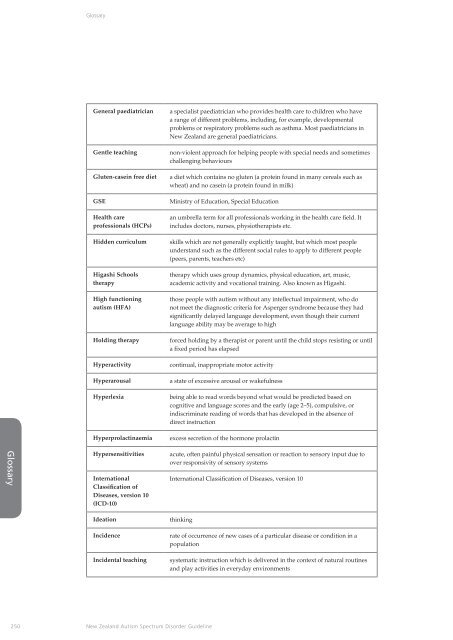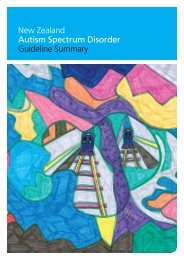New Zealand Autism Spectrum Disorder Guideline - Ministry of Health
New Zealand Autism Spectrum Disorder Guideline - Ministry of Health
New Zealand Autism Spectrum Disorder Guideline - Ministry of Health
Create successful ePaper yourself
Turn your PDF publications into a flip-book with our unique Google optimized e-Paper software.
Glossary<br />
General paediatrician<br />
Gentle teaching<br />
Gluten-casein free diet<br />
GSE<br />
<strong>Health</strong> care<br />
pr<strong>of</strong>essionals (HCPs)<br />
Hidden curriculum<br />
Higashi Schools<br />
therapy<br />
High functioning<br />
autism (HFA)<br />
Holding therapy<br />
Hyperactivity<br />
Hyperarousal<br />
Hyperlexia<br />
Hyperprolactinaemia<br />
a specialist paediatrician who provides health care to children who have<br />
a range <strong>of</strong> different problems, including, for example, developmental<br />
problems or respiratory problems such as asthma. Most paediatricians in<br />
<strong>New</strong> <strong>Zealand</strong> are general paediatricians.<br />
non-violent approach for helping people with special needs and sometimes<br />
challenging behaviours<br />
a diet which contains no gluten (a protein found in many cereals such as<br />
wheat) and no casein (a protein found in milk)<br />
<strong>Ministry</strong> <strong>of</strong> Education, Special Education<br />
an umbrella term for all pr<strong>of</strong>essionals working in the health care field. It<br />
includes doctors, nurses, physiotherapists etc.<br />
skills which are not generally explicitly taught, but which most people<br />
understand such as the different social rules to apply to different people<br />
(peers, parents, teachers etc)<br />
therapy which uses group dynamics, physical education, art, music,<br />
academic activity and vocational training. Also known as Higashi.<br />
those people with autism without any intellectual impairment, who do<br />
not meet the diagnostic criteria for Asperger syndrome because they had<br />
significantly delayed language development, even though their current<br />
language ability may be average to high<br />
forced holding by a therapist or parent until the child stops resisting or until<br />
a fixed period has elapsed<br />
continual, inappropriate motor activity<br />
a state <strong>of</strong> excessive arousal or wakefulness<br />
being able to read words beyond what would be predicted based on<br />
cognitive and language scores and the early (age 2–5), compulsive, or<br />
indiscriminate reading <strong>of</strong> words that has developed in the absence <strong>of</strong><br />
direct instruction<br />
excess secretion <strong>of</strong> the hormone prolactin<br />
Glossary<br />
Hypersensitivities<br />
International<br />
Classification <strong>of</strong><br />
Diseases, version 10<br />
(ICD-10)<br />
acute, <strong>of</strong>ten painful physical sensation or reaction to sensory input due to<br />
over responsivity <strong>of</strong> sensory systems<br />
International Classification <strong>of</strong> Diseases, version 10<br />
Ideation<br />
Incidence<br />
Incidental teaching<br />
thinking<br />
rate <strong>of</strong> occurrence <strong>of</strong> new cases <strong>of</strong> a particular disease or condition in a<br />
population<br />
systematic instruction which is delivered in the context <strong>of</strong> natural routines<br />
and play activities in everyday environments<br />
250<br />
<strong>New</strong> <strong>Zealand</strong> <strong>Autism</strong> <strong>Spectrum</strong> <strong>Disorder</strong> <strong>Guideline</strong>











